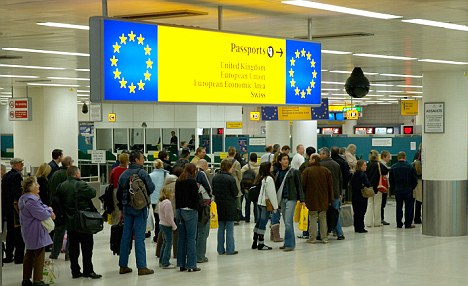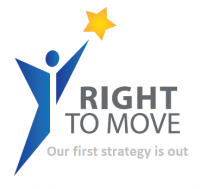by info@ecas.org | Nov 6, 2014 | News
Press Invitation How much do EU citizens living abroad contribute and how much do they receive from the host country? A wide spectrum of political parties will discuss European Citizen Action Service (ECAS) Study on the Fiscal Impact of EU Migration in the UK, Germany, the Netherlands and Austria at the European Parliament on 12 November 2014. This study was launched in response to threats by certain member states to restrict the right to free movement of people in the EU. It identifies whether EU migrants are a burden to the social security systems of the four member states, based on available data. Assya Kavrakova, ECAS’ Director, stated, “The EU should call on the Member States to collect harmonized data on the impact of free movement in their respective countries if we are to have an evidence-based debate on this issue.” You are welcome to come and join the debate at the European Parliament on 12 from 13.00 – 15.00, room ASP 5E1 to provide your input to the discussion. Media Invitation...

by info@ecas.org | Nov 5, 2014 | News
Today, ECAS and the EU Rights Clinic are launching the third of Seven Strategies to improve the free movement of persons as part of the Right to Move campaign. The third strategy calls on the civil society organisations to be empowered to help citizens overcome obstacles. Empowering civil society will assist in meeting the legal needs of EU citizens. Despite a significant majority of EU citizens being aware that they have a right to move within the EU, almost two-thirds of them feel they do not have a sufficient awareness of their EU rights. Less than a quarter of citizens feel sufficiently well informed about what to do if their EU rights are not respected and about a fifth of the problems were the result of citizens’ own lack of awareness of their rights. EU citizens who make use of their right to free movement continue to face significant obstacles in the exercise of their EU rights with more than 25% of citizens reporting that they encountered problems in moving within the EU. Empowering civil society groups to inform and assist mobile citizens will ensure that citizens can make effective use of their fundamental right of free movement and overcome obstacles that may come their way. Read the Third...
by info@ecas.org | Nov 4, 2014 | News
A Citizen’s Story In all the rhetoric surrounding free movement, it is easy to forget that the issue affects real people. Mr. L has kindly offered to share his story with us. He has been living in the UK for 9 years and is married to a non-EEA citizen. In those 9, neither Mr. L nor Mrs. L has claimed benefits. In addition, he has been denied a UK residence card, on the basis that he does not have private health insurance. I moved to Britain 9 years ago, soon after my home country joined the EU. I came in order to improve my English, explore new horizons and possibly start a new life in an exciting, multicultural land. I began working two days after my arrival, first as a manual labourer at a ladder factory, and later behind the bar at a club. There I met my future wife, who worked alongside me. She is originally from Kenya and when we met she had already been living in Britain for a few years as a student. She was about to finish her BA degree and she inspired me to also take up studying. We started working at a country hotel together, her as a receptionist and me as a night porter, and got married less than a year later; I commenced my studies soon afterwards. I continued working as a night porter during the first year of university. Managing both my work and my studies was very difficult, and so I really welcomed the opportunity to receive a student loan and a grant from the second year onwards....

by info@ecas.org | Oct 29, 2014 | News
Today, ECAS and the EU Rights Clinic are launching the second of Seven Strategies to improve the free movement of persons as part of the Right to Move campaign. The second strategy calls on the European Commission to be given enhanced powers of investigation to enforce the EU rules on the free movement of persons. Presently, the Commission’s powers to enforce the free movement rules are limited to launching formal infringement proceedings against Member States. These proceedings are cumbersome and can take several years to result in court action. The European Commission also retains a discretion as to which complaints to pursue as it is under no obligation to launch infringement actions. Several recent cases – namely, the expulsion of Roma from France, the short-lived reintroduction of border controls in Denmark and delays at the Gibraltar/Spain border – have shown that the Commission’s powers of investigation are limited. The Commission currently lacks the power to undertake unannounced inspections to investigate suspected infringements of the free movement rules. It cannot interview citizens or compel officials to provide testimony or to take other forms of evidence. These are serious limitations on the Commission’s powers to investigate breaches of the EU’s free movement rules. Given that the free movement of persons is one of the cornerstones of the Single Market, the Commission needs to have stronger powers to investigate infringements. There is no justifiable reason why the free movement rules should remain the poorer cousin of the EU rules relating to the Schengen area or even the competition or air transport rules for that matter. Citizens deserve no less than a Commission...

by info@ecas.org | Oct 23, 2014 | News
ECAS is pleased to invite you to a lunchtime seminar “Free Movement in the EU Today: Challenges and Opportunities” organized together with Ms Jean Lambert, MEP on the 12th of November at the European Parliament, Brussels from 13.00 – 15.00, room ASP 5E1 (A light lunch will be available from 12.45) The meeting will shed light on the various current issues concerning free movement in the EU and will present the findings of an independent study on the “Fiscal impact of EU migrants in selected EU countries”. Based on this study and on recent developments in the field of the implementation of the right to free movement of persons in Europe, ECAS will also reveal seven concrete strategies to ensure that free movement rules can work better for all EU citizens. The keynote speakers of the Conference will be Mrs. Assya Kavrakova- Director of ECAS, Ms Jean Lambert- MEP, Mr. Latchezar Bogdanov- Open Society Institute – Sofia Board member and Industry Watch Managing partner and Mr. Anthony Valcke- EU Rights Clinic (ECAS – University of Kent in Brussels) Please RSVP through the Online form by the 30th October. If you need an access badge to enter the European Parliament please include your full name, date of birth, nationality, ID number and type of document (passport/ID card). If you have any inquiries, please contact us at elisa.bruno@ecas.org Download the...

by info@ecas.org | Oct 22, 2014 | News
Today, ECAS and the EU Rights Clinic are launching the first of Seven Strategies to improve the free movement of persons as part of the Right to Move campaign. The first strategy calls upon the European Institutions to recast the Directive 2004/38 on residence rights into a Regulation, which would help to reduce divergences in administrative formalities in the EU and ensure that private companies and national administration alike respect free movement rights. Although this Directive has the objective of simplifying and strengthening residence formalities for EU citizens and their family members, Member States have used it as a pretext to tighten up their national rules governing EU rights of residence, for example as regards the conditions relating to healthcare insurance. As a result, EU citizens and their family members continue to face significant obstacles when trying to comply with residence and visa formalities. The Right to Move campaign consists in advocating for Seven Strategies to improve the free movement of persons in the EU. The proposed Seven Strategies aim to improve the application and understanding of the free movement of persons in the EU in order to alleviate the problems faced by thousands of EU citizens every year. For the first time in the EU’s history, we are hearing calls in several EU countries for rethinking one of the cornerstones of the EU’s Single Market and the right which is most cherished by citizens in Europe today. In April last year, the Ministers of four EU Member States – the UK, Austria, Germany and the Netherlands – called on the Irish Presidency of the European Council to consider...




